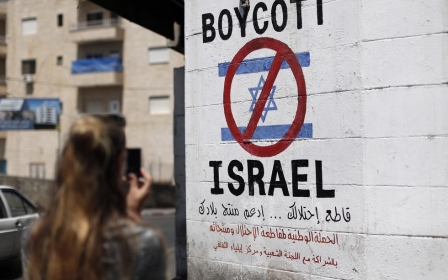UK moves to ban municipal boycotts of Israel won’t stop BDS

British Conservative ministers have announced a new policy to block local councils from choosing to boycott or divest from companies complicit in the illegal Israeli occupation of Palestine. Aides said that the new policy, to be detailed in an amendment to procurement policy guidance, is a response to “militant actions of leftwing councils”.
The move is a clear attempt to clamp down on the growing power of the grassroots boycott, divestment and sanctions (BDS) movement which aims to end government and corporate complicity with Israel’s violations of Palestinian rights.
For the past decade, trade unions representing thousands of workers, student unions, faith groups and indeed, local councils have mobilised to end UK complicity with Israel’s repeated violations of international law in its policies against Palestinians. Where the UK government has failed to hold Israel to account for its abuse of Palestinians, ordinary citizens have stepped in. At least a dozen local councils have taken steps to divest from companies engaged in Israeli human rights abuses.
The new policy would essentially force local councils to turn a blind-eye to corporate complicity in violations of international law, and to ignore local concerns in favour of good diplomatic relations with a notorious human rights abusing country.
Campaign successes cause concern
As Israel’s systematic violence against Palestinians has increased, so has the movement of people who are fed up with the UK’s unrelenting support for this oppression. Companies specifically targeted include French multinational Veolia, which weeks ago bent to the pressure of BDS campaigns and sold off its stakes in its Israel projects, ending its complicity in the illegal occupation.
Another company targeted by campaigners is G4S, the British private security company which provides equipment and services to the Israeli prison system, Israeli police, and military checkpoints. G4S has come under considerable pressure from BDS campaigners in the past year, in particular when the Bill and Melinda Gate Foundation sold off its shares in the company after pressure from the BDS movement.
The Tory government ban on local council action must be understood as repression of a growing movement calling on the UK to follow its own obligations under international law. It demonstrates the government fear of an active and informed citizenry who will not look the other way and continue to swallow lies and whitewashings.
UK-Israel arms trade: a threat to human lives
According to a Conservative spokesman, the new policy will mitigate the “threat” that human rights campaigners can cause to the UK military and defence industry, which enjoys a close relationship with Israel through the arms trade and joint military trainings. In 2014 alone, the UK licensed over £40 million worth of military exports to Israel, not suspending even one licence while Israel was committing war crimes in the bombing of Gaza that summer. This is despite the fact that the Foreign Office includes Israel on a list of “countries of concern” for human rights abuses. The UK’s own export criteria, if implemented, would ban military exports to countries which violate international humanitarian law, or when there is a “clear risk” of the weapons being used “to assert by force a territorial claim”.
The UK-Israel arms trade has come into focus after the summer 2014 war, when 2,205 Palestinians were killed in relentless Israeli bombardments of the Gaza Strip. At that time, hundreds of thousands of people in the UK took to the streets demanding a two-way arms embargo on Israel, and campaigning groups have followed up with focused research and actions targeting the deadly trade in weapons which allows Israel to kill and destroy with impunity.
Ghosts of boycotts past
This use of “lawfare” to repress that BDS movement has recent precedent. Similar motions have been approved in the US, most recently in an anti-BDS amendment added on to a fast-track trade bill which gave the president authority to negotiate trade deals like TTIP without public input. The language from the amendment was then adapted for local legislation in various US cities. Now it seems that the UK government is borrowing from the powerful American Israel lobby’s playbook, and adding this to the long list of repressive anti-free speech policies they have introduced in the past years.
A similar anti-boycott policy was also introduced by Margaret Thatcher in 1988, aimed at restricting local councils from taking action to end British complicity in South Africa’s apartheid regime. This was at a time when the anti-apartheid movement was beginning to see overwhelming support and public participation, and the motion was a similar attempt to keep it from growing. But despite the fear tactics with legal restrictions, local councils increased their opposition to investment in South Africa, contributing to the eventual toppling of the South African apartheid regime.
As the new policy was proposed, the Israeli army, police and settlers were on a violent rampage in the West Bank, attacking Palestinians and setting fire to their agricultural lands and cars, resulting in the death of several young Palestinians and injuring hundreds. The people of the UK can’t un-see the violent images, nor can the complicit companies hide their involvement anymore. The UK government should be welcoming citizen action to end Israeli apartheid. Seeking to outlaw it will only make this movement for justice grow stronger.
- Ryvka Barnard is senior campaigns officer on militarism and security at War on Want
The opinions expressed in this article are those of the author and do not necessarily reflect the editorial position of Middle East Eye.
Photo: Israeli soldiers beat up Palestinians as they take some protesters into custody during a protest against preventing Palestinians from entering the Al-Aqsa Mosque compound, on 7 October 2015, near a checkpoint of an Israeli settlement in Beit El, West Bank. (AA)
New MEE newsletter: Jerusalem Dispatch
Sign up to get the latest insights and analysis on Israel-Palestine, alongside Turkey Unpacked and other MEE newsletters
Middle East Eye delivers independent and unrivalled coverage and analysis of the Middle East, North Africa and beyond. To learn more about republishing this content and the associated fees, please fill out this form. More about MEE can be found here.





